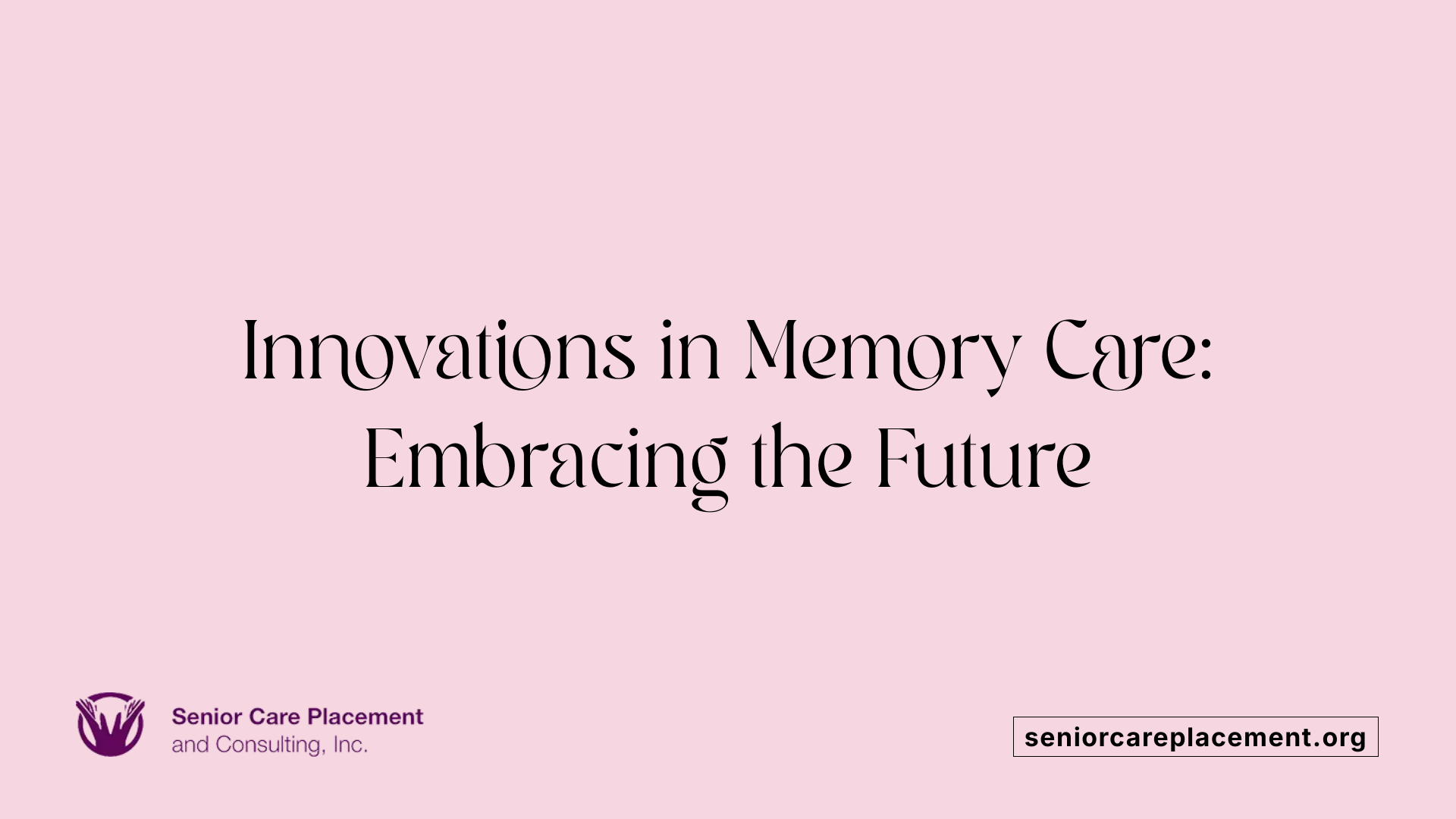How to Choose Senior Care That Offers Specialized Memory Care Programs
Navigating the Complexities of Memory Care for Seniors

Understanding Memory Care: A Specialized Approach
Choosing the right senior care for a loved one experiencing memory loss, whether due to dementia or Alzheimer's disease, requires careful planning and understanding of specialized memory care programs. These programs offer tailored environments, activities, and professional care that aim to accommodate the unique needs of those with memory impairments. This article explores various aspects of memory care, from facility types and staff qualifications to financial considerations, ensuring families can make informed decisions for their loved ones' well-being.
Defining Memory Care: An Overview

What is memory care?
Memory care is a specialized form of residential long-term care designed specifically for individuals with Alzheimer's disease and other types of dementia. These facilities offer structured support, 24-hour supervision, and a safe environment that includes features like secure entry points to prevent wandering.
The differences between memory care and other senior living options are significant. Unlike standard assisted living facilities, memory care units have staff who receive specialized training in dementia care, ensuring they can effectively manage the unique challenges associated with cognitive impairments.
How is memory care different from assisted living?
While both memory care and assisted living cater to seniors needing assistance, memory care is tailored to individuals diagnosed with memory loss issues—offering enhanced safety measures and therapeutic activities designed to stimulate cognitive engagement.
Assisted Living:
- Focuses on seniors who need help with daily tasks but retain more independence.
- Activities may not specifically target cognitive stimulation.
Memory Care:
- Provides a secure environment with comprehensive support for behavioral management and mental engagement.
- Emphasizes creating structured activities that promote socialization and cognitive health, such as arts and crafts and music therapy.
These distinctions play a crucial role in the care and well-being of seniors experiencing cognitive decline, leading families to make informed choices regarding the type of care their loved ones require.
Types of Memory Care Facilities and Services Offered

What are the different types of memory care facilities?
Memory care facilities cater to seniors experiencing Alzheimer’s and other forms of dementia, providing safe and supportive environments. The types of memory care options include:
- Assisted Living Facilities with Memory Care Units: These facilities offer structured support for individuals needing help with daily activities while providing specialized memory programs.
- Nursing Homes with Specialized Dementia Care Programs: Suitable for advanced stages of dementia, these homes provide 24-hour medical care and supervision.
- Adult Day Care Centers: These centers offer daytime respite for caregivers and social engagement opportunities for residents, focusing on cognitive stimulation and support.
What services and activities are provided?
Memory care facilities typically provide a range of services to enhance residents' quality of life, including:
| Service Type | Description | Example Activities |
|---|---|---|
| Medication Management | Ensures residents receive the correct medications on time. | Regular medication reviews and adjustments. |
| Daily Living Assistance | Helps residents with essential daily tasks such as bathing, dressing, and eating. | Individual assistance during meal times. |
| Structured Cognitive Therapies | Activities aimed at stimulating cognitive function. | Music therapy, arts and crafts, and cognitive exercises. |
| Physical Activities | Engage residents physically and socially. | Group exercises, outdoor walks, and games. |
By ensuring a specialized focus on memory care, these facilities provide comprehensive services that are critical to supporting the well-being and engagement of residents.
Evaluating Staff Qualifications and Safety Measures

Why are staff qualifications important in memory care communities?
Staff qualifications are crucial as caregivers trained in memory care techniques can effectively manage the unique challenges faced by residents, such as memory loss and behavior management. Facilities should have a well-trained team able to provide compassionate care and appropriate interventions for safety and engagement.
In memory care settings, staff undergo specialized training designed to handle cognitive impairments, ensuring they are equipped to meet residents' specific needs. This training often covers strategies to alleviate confusion, manage difficult behaviors, and implement therapeutic activities that promote mental engagement.
What safety measures should be present in memory care environments?
Safety is a top priority in memory care communities, as residents often face the risk of wandering and other safety concerns. Facilities implement various precautions to create a secure living environment. Common safety features include:
- Wide Hallways and Clear Signage: Helps residents navigate easily and reduces the risk of getting lost.
- Grab Rails and Non-slip Flooring: These features prevent falls and promote mobility.
- Emergency Call Systems: Allow residents to seek immediate help when needed.
- Secured Entrances and Exits: Prevent wandering and unauthorized access, ensuring residents' safety.
By prioritizing staff qualifications and safety measures, memory care communities can provide a nurturing environment conducive to the well-being of residents.
Comparing Memory Care with Other Senior Living Options
What distinguishes memory care from assisted living?
Memory care is specifically designed for individuals with Alzheimer's disease or other forms of dementia. It provides a higher level of specialized care than standard assisted living facilities. Here are key differences between the two:
Staffing: Memory care facilities typically maintain a staff-to-resident ratio of around 1:5 or 1:6. This ensures individualized attention and support, crucial for residents with cognitive impairments.
Safety Features: Specialized safety measures in memory care communities include secured entrances and exits to prevent wandering, as well as features such as wide hallways and grab rails. These enhancements are tailored to the unique needs of residents with memory loss.
Engaging Activities: Memory care programs offer structured activities specifically designed to stimulate the minds of residents, such as music therapy and cognitive exercises. In contrast, assisted living may not focus as intensely on cognitive engagement.
Type of Care: While assisted living provides support for seniors who retain a degree of independence, memory care is dedicated to those who need constant supervision and personalized care plans. This structured support can significantly enhance the quality of life for individuals facing memory challenges.
Visitor Insight: Choosing the Right Memory Care Facility
What should families consider when evaluating memory care facilities?
When searching for a suitable memory care community for a loved one, several factors should be taken into account during facility visits. It's essential to observe the interactions between staff and residents. Positive engagement and attentive care indicate a nurturing environment.
Facility cleanliness is another vital aspect; a well-maintained facility reflects commitment to residents’ health and comfort. Additionally, assess the availability and variety of programs designed to stimulate cognitive engagement. Activities such as music therapy, arts and crafts, and physical fitness routines can significantly enhance residents' quality of life.
Questions to ask during evaluations
During evaluations, families should prepare a list of questions to ensure the chosen facility meets their loved one’s needs. Key inquiries may include:
- What is the staff's training level in memory care? This determines how well they can manage the unique challenges associated with dementia and Alzheimer's.
- What safety measures are in place? Ask about emergency call systems and secure entry points to prevent wandering.
- What meal options are available, and how are they tailored to residents’ dietary needs? Nutritional considerations are crucial for maintaining health.
- How are personalized care plans developed? Understanding how the facility tailors care to individual capabilities and preferences can ensure a better fit for the resident.
By thoroughly evaluating these aspects, families can find a memory care facility that provides a safe, enriching environment for their loved ones.
Financial Considerations and Funding Options

Costs associated with memory care
Memory care services often come with a higher price tag than standard assisted living, reflecting the specialized attention and support provided. On average, families can expect to pay around $6,200 per month for memory care. This cost can vary significantly based on location, facility amenities, and level of care needed. Nursing homes, which provide a higher level of medical care, generally range from $10,562 to over $11,000 monthly.
It's essential for families to assess their budget and consider costs over time, given that the average duration of stay in memory care can be lengthy.
Insurance and financial support options
Understanding the financial landscape for memory care is critical for families. Medicare does not cover room and board costs in memory care facilities; its coverage focuses primarily on medical needs related to cognitive support.
However, family assistance can be obtained through various avenues:
| Source | Coverage/Support | Eligibility Considerations |
|---|---|---|
| Medicaid | Can help with costs for eligible individuals; varies by state. | Income-based eligibility; check state rules. |
| Long-term care insurance | May cover some or all memory care costs; policy details vary. | Depends on individual policy provisions. |
| Personal Savings | Direct payment by families or individuals for care services. | No eligibility criteria but requires planning. |
| State programs | Some states offer assistance for long-term care needs, including SSDI/SSI. | Dependent on qualifications for specific services. |
| Veterans’ benefits | May provide financial aid for eligible veterans receiving memory care. | Must meet military service and care requirements. |
Exploring these options as early as possible is key in managing costs and ensuring the best quality of care for loved ones.
Understanding the Emotional Impact on Families
What is the emotional impact on families during transitions to memory care?
Transitioning a loved one to a memory care facility can elicit a complex range of emotions in families. Feelings of guilt, relief, and anxiety often surface as families grapple with the decision and its implications for their loved one. Many family members may feel they are abandoning their loved ones, which can lead to significant emotional turmoil. The transition can also spark relief, especially when recognizing that professional caregivers can provide the specialized support needed.
To navigate these challenges, engaging the family in the decision-making process is crucial. This involvement fosters a sense of shared responsibility and can alleviate feelings of isolation. Seeking support from fellow caregivers or joining support groups equipped to handle similar experiences can also be invaluable. Maintaining open communication with the memory care providers ensures that family members remain informed, facilitating smoother transitions and enhancing their roles in the ongoing care.
By addressing these emotional dynamics, families can find ways to support both their loved one and themselves through this significant life change.
The Future of Memory Care: Innovations and Growth

What innovative therapies are available in memory care?
Memory care facilities are stepping beyond traditional approaches by incorporating a variety of innovative therapies. These include:
- Music Therapy: Engages residents through familiar tunes, helping to evoke memories and encourage emotional connections.
- Art Therapy: Provides creative expression, allowing residents to tap into their artistic abilities while fostering engagement and social interaction.
- Pet Therapy: Involves interaction with trained therapy animals, which can reduce anxiety and increase feelings of happiness among residents.
- Cognitive-Behavioral Programs: Focus on enhancing the cognitive functions of residents through structured tasks and social interactions, promoting mental fitness and improving overall well-being.
Innovations aim to not only maintain cognitive function but also offer joyful, meaningful experiences tailored to individual residents' needs. The goal is to create a stimulating environment that prioritizes engagement and comfort, improving the quality of life for individuals living with memory challenges.
Current trends in memory care
As memory care continues to evolve, several trends are shaping its future:
- Personalized Care Plans: Facilities are increasingly focusing on individualized care strategies that respond to each resident's unique preferences and cognitive challenges.
- Increased Family Involvement: There's a growing emphasis on involving family members in care decisions and activities, fostering a supportive and familiar atmosphere.
- Technological Integration: The incorporation of technologies, such as monitoring systems for safety and apps for communication between families and staff, is enhancing both care quality and transparency.
- Community Focus: Many facilities are shifting their emphasis from confinement to creating a community-oriented environment that encourages social interaction and physical activities.
By embracing these trends and innovative therapies, memory care communities are moving towards a future that prioritizes the dignity and well-being of residents with memory loss.
Making an Informed Decision for Your Loved Ones
Choosing a memory care facility for a loved one involves balancing multiple factors, from understanding the different types of facilities available to evaluating staff qualifications and financial implications. It also requires emotional preparation for the transition. By thoroughly researching options, visiting facilities, and asking the right questions, families can ensure they choose the best possible environment for their loved ones' needs, creating a comprehensive care plan that supports their well-being and quality of life.
References
- How to Choose a Memory Care Community - Weatherly Inn
- How to Choose Care for Alzheimer's and Dementia - Solace
- Memory Care Options for Low-Income Seniors - WebMD
- Choosing the Right Memory Care | Mountain Vista
- Tips for Choosing the Right Memory Care for Loved Ones
- How to Choose the Right Senior Care Services for Your Loved Ones
- Long-Term Care - Alzheimer's Association
- Assisted Living vs. Memory Care: Choosing the Right Senior Living ...





































































































